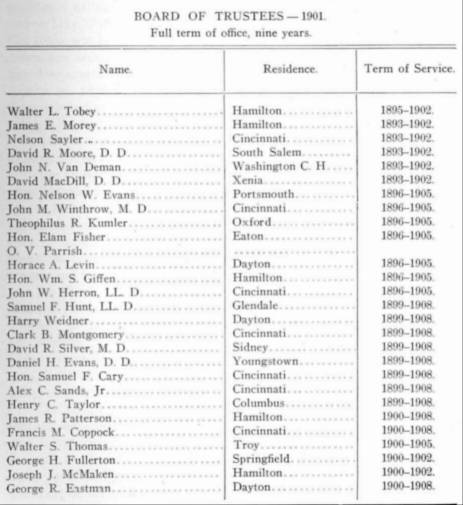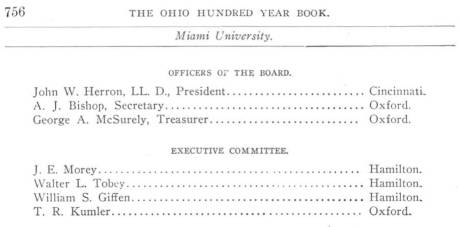|
GREAL institutions grow. They are not born in a day. It is a part and a privilege of an American to feel a pride in America's historic foundations and institutions. In the document under which the great northwest territory was settled, we read: "Religion, morality and knowledge being necessary to good government and the happiness of mankind, schools and the means of education shall forever be encouraged." This sentence is the foundation of the educational policy of the states formed out of this territory. The John Cleves Symmes purchase in southwestern Ohio, like the other grants made under this ordinance, laid permanently the foundation for higher education. Out of this land grant grew Miami University. The trust was given to the State of Ohio and accepted in 1803, and by means of legislative action buildings were erected and the school opened in 1816 as a preparatory school, and in 1824, as a college. The first class was graduated in 1826. Under the stimulus of the land grant, the spirit of the ordinance of 1787, the cooperation of the state and the rapid settlement of Miami county, the college flourished and soon became the most renowned west of the Alleghenies. The early settlers believing in the value of college education sent their sons there. These young men later became the men of affairs and took and active interest in every form of public life. During the war of the rebellion, Miami's graduates, almost to a man, were found enlisted or engaged in some form of public service. Many of these men are still hard at work, so that it has been said that Miami has more prominent men among her alumni than any other western college. A strong American sentiment permeates the every vein of the Miami student or graduate. Miami has been pre-eminently in her history, a college of public spirit. The student catches the spirit of patriotic devotion to the public welfare as a duty, and the graduate feels that he owes something to his country. College spirit has always been identical with a high idea of citizenship. Associated with this patriotic ideal, is the conviction that leaders should be men of scholarship and sound character. The management has never faltered in that belief that a college faculty should be men of unquestionable character and highest ability. The college education shows itself in a patriotic citizenship, genuine manliness, sound scholarship and liberal culture. Under this ideal more than a thousand men have been graduated, and many times the number have pursued their courses in part. While Miami University is not owned and operated by the State of Ohio, in recent years favorable legislative action has given Miami more vigorous life than ever before. One of the new buildings is the gift of the late Senator Brice and bears his name. Another bears the name of Hon. John W. Herron of Cincinnati, whose long and able services to the University have only been equalled by his generosity. The location is as healthful as can be found, and comprises fifty-seven acres of the most beautiful campus to be found in the west. Miami has never been a large institution when measured by her numbers, nor has she ever aspired to be such, but she has been great when measured by her men. Instructions in military tactics and drill three hours each week are required of all male students unless excused by the faculty. This feature id in the charge of an officer of the United States Army, assigned to that service by the president. A regulation uniform is provided for, and may, if desired, be worn at all times in place of another suit of clothes. There is no intention of making Miami University a military school. It simply offers all the advantages of such an institution with none of the disadvantages, a fact greatly appreciated.
|
Return to Early Institutions
Go to Main Page

